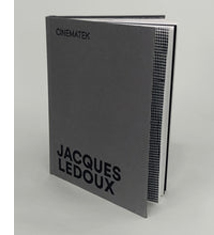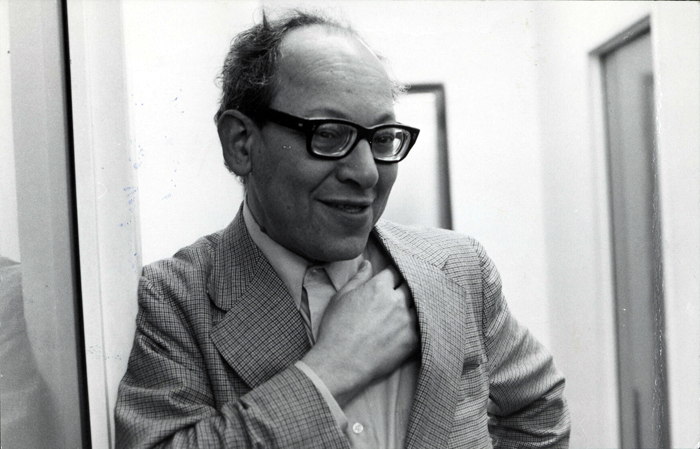Jacques Ledoux.
DB here:
Jacques Ledoux, one of the world’s premiere film archivists, died in 1988, but his example and influence live on. An insatiable cinéphile, a friend to filmmakers around the world, and a tireless collector of films for the Royal Film Archive of Belgium [2], Ledoux did not have the celebrity status of Henri Langlois. Quietly and modestly, he went about the task of building one of the great film libraries and launching traditions that outlived him. He was at the center of Belgian film culture, which was as cosmopolitan as any you would find in bigger European or American cities.
Central examples of his enterprise: EXPRMNTL, the Knokke-le-Zout experimental film festival; [3] the annual Cinédécouvertes summer festival showcasing films of exceptional ambition that had not yet found a local distributor; and the L’Age d’or prize for films challenging “cinematic conformism.” Martin Scorsese’s The Big Shave (1967) had its premiere at Knokke, where it won the Prix L’Âge d’or. The first winner, in 1955, was Agnès Varda for La Pointe Courte; later winners read like a roster of great directors [4]. The impulse continues to this day [5]. In addition, Ledoux established a distribution branch that allowed student groups and film clubs to borrow prints for their screenings.
There were always obscure legends about his past. “Jacques Ledoux”–“Jacques the Gentle”–was a name he took late in life. Eventually we learned that as a boy he survived the Holocaust by jumping off a train shipping him to Auschwitz. By the end of the 1940s he was participating in the Archive’s activities and he eventually became the director.
Ledoux set about creating a vast showcase of world cinema. Five screenings, two of them silent films, ran every day of the year. Admission prices were low, to permit students to come. At the same time, Ledoux oversaw collections of film technology that formed the basis of educational exhibits. The Archive became the center of the city’s film activities.
Ledoux was a passionate collector, amassing films from far outside Belgium. He was curious about all types of cinema, mass-market and esoteric. When the Nouvelle Vague directors wanted to see a film banned in France, they took the train to Brussels and Ledoux’s domain. The same urge for comprehensiveness informed his efforts to document film history, with filmographies and background information in books published by the Archive. He became a moving spirit of FIAF, the International Association of Film Archives; here [6] you can read about his many accomplishments in that area, as well as his eventual friction with the organization.
 [7]His generosity extended to young researchers like Kristin and me, who were welcomed to study films at the Archive. That became the basis of our lifelong friendships with Archive staff and many Belgian cinéphiles, as sometimes chronicled in our blog entries. So grateful was I for Ledoux’s assistance that when I was offered a professorship at my university, I gave it his name. He had just died, and he probably would have protested that he wasn’t worthy; but he has remained an inspiration to us for over forty years.
[7]His generosity extended to young researchers like Kristin and me, who were welcomed to study films at the Archive. That became the basis of our lifelong friendships with Archive staff and many Belgian cinéphiles, as sometimes chronicled in our blog entries. So grateful was I for Ledoux’s assistance that when I was offered a professorship at my university, I gave it his name. He had just died, and he probably would have protested that he wasn’t worthy; but he has remained an inspiration to us for over forty years.
The Archive, now calling itself the Cinematek, has just finished a centenary exhibition devoted to Ledoux. Christophe Piette, organizer of the event, has memorialized it in a lovely multilingual book that gathers reminiscences by Ledoux’s colleagues. There are memoirs by Noël Desmet [8], Clementine Deblieck, Jean-Paul Dorchain, Hilde Delabie, and Gabrielle Claes, Ledoux’s successor as director. Bernard Eisenschitz, Eric De Kuyper, and P. Adams Sitney offer illuminating appreciations of Ledoux’s contributions. (Sitney’s very full account of Knokke doings is a crucial document in the history of the American avant-garde.) Ledoux’s own voice is represented by a program note for a 1968 science-fiction series. There are many wonderful illustrations–photos, posters, correspondence (Cocteau, Lenica, Akerman). Kristin and I have provided recollections of a man we immensely admired. When you read one of our blog entries on older films, classic or little-known, chances are good that we first saw the film at the Cinematek.
The book is published in a limited edition but is available for purchase at https://cinematek.myshopify.com/en/collections/boeken/products/jacques-ledoux [9]. Every university library with a substantial collection of film literature should acquire a copy!
Anke Brouwers has written a vivid overview of Ledoux’s career [10] for the exposition. Many nifty documents are illustrated.
There are too many citations of Ledoux and the Archive on our site for me to list them. Two extensive ones are “Ledoux’s Legacy” [11] and “Watching movies very, very slowly.” [12] For others, you could try the Search function (using “Brussels”) to find accounts of our many visits.
